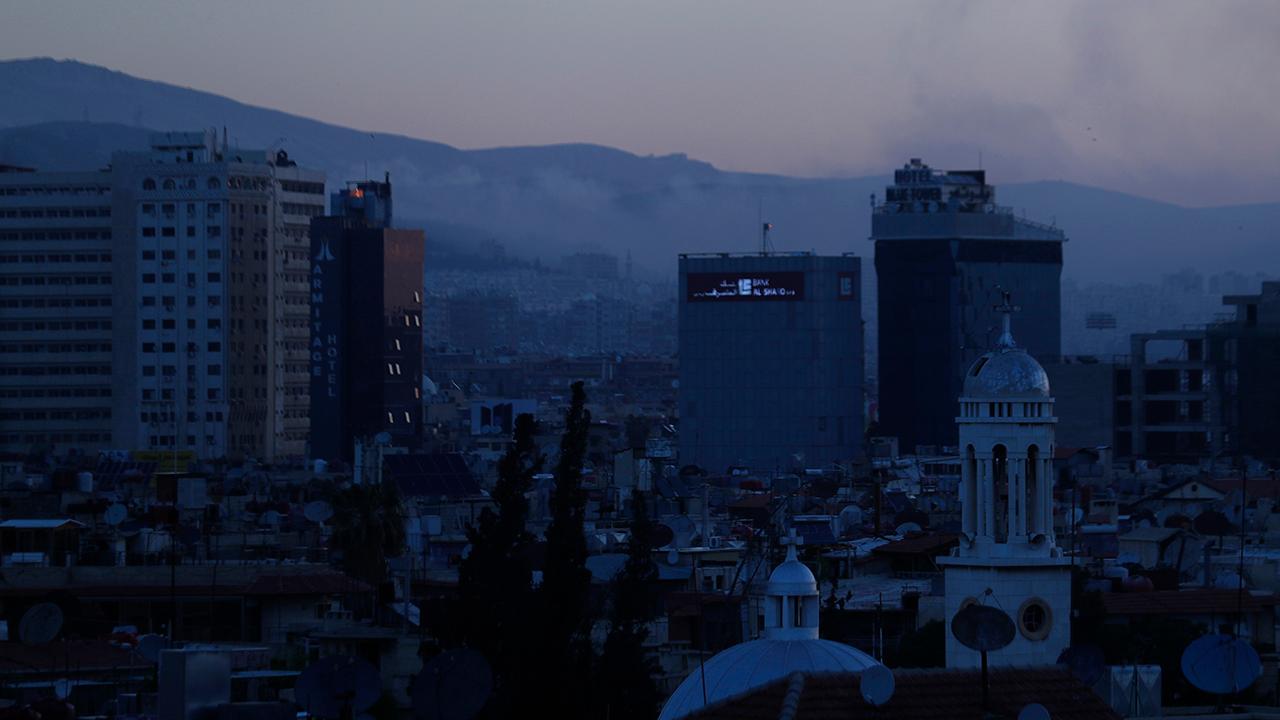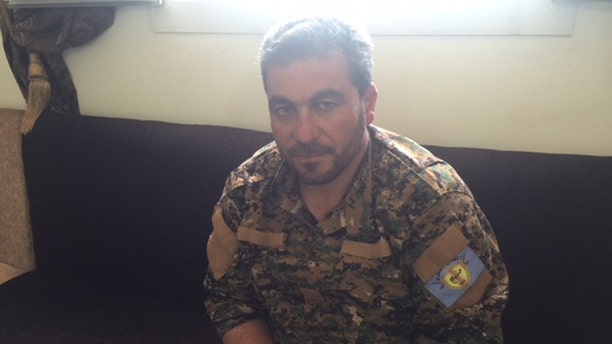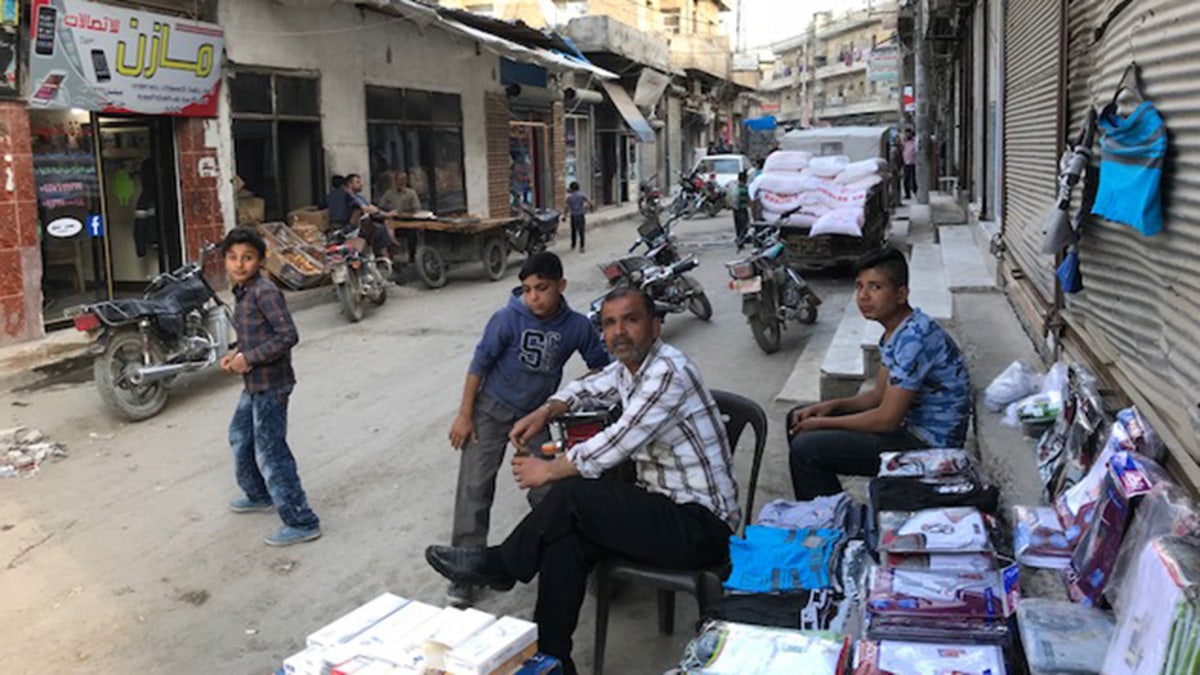
After weeks of questions and concerns from locals over the U.S commitment to the region, many see the U.S strikes against the authoritarian regime as a hopeful sign of a deeper and more long-lasting role. (Photographs by Hollie McKay)
A military convoy rolled down a rubbled road outside the northern Syrian city of Manjib on Saturday afternoon, just hours after news that the U.S and allied forces had struck a number of Syrian regime facilities in and around the capital of Damascus.
Gule, a young female soldier with the 5,000-strong Manbij Military Council (MMC) stops and stares in awe for a moment as they pass.
“It is beautiful,” she declares to no one in particular.
Gule’s sentiment is echoing this city once held by the Islamic State (ISIS), which now houses numerous U.S. military installations backing the Syrian Democratic Forces (SDF) controlling much of the region.
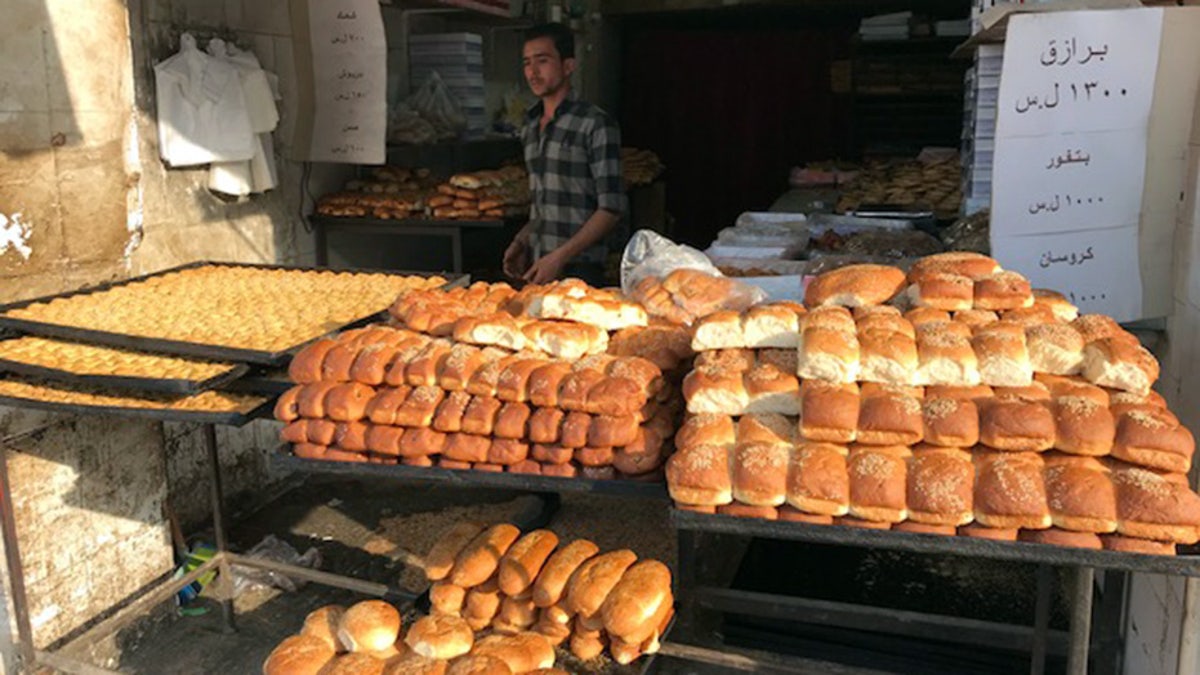
The streets are filled with markets and motorcycles, women and men roam freely through the bazaars, and people sip tea along the sidewalks. (Fox News)
After weeks of questions and concerns from locals over the U.S commitment to the region -- concerns fueled by President Trump’s recent statement that would soon be pulled -- many see the U.S strikes against the authoritarian regime as a hopeful sign: Not only is America willing to take the lead against blatant violations putting civilians in dire peril, it is here to stay.
While much of Syria remains plagued by changing checkpoints and intermittent bombing, Manbij remains a bustling yet seemingly calm city. The streets are filled with markets and motorcycles, women and men roam freely through the bazaars and sip tea along the sidewalk.
“We are so happy the U.S. troops are here. The most important thing is we know we won’t be bombed when the U.S. is here,” said Khalid, a 31-year-old mobile phone seller and graduate of Homs University. “If they leave, we worry Russians will be the first to come in and bomb us. Right now, we are calm and comfortable.”
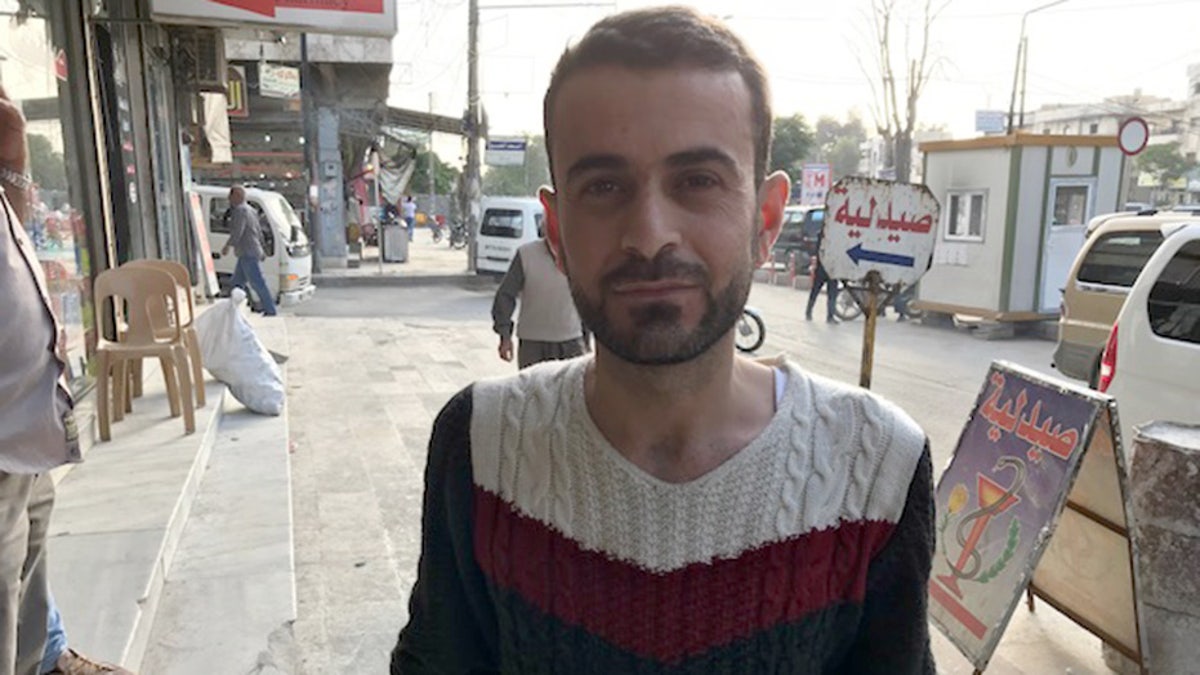
“We are so happy the U.S. troops are here. The most important thing is we know we won’t be bombed when the US is here,” explained Khalid. (Fox News)
Mahmoud, a 60-year-old purveyor of sweets, also expressed gratitude over being spared the aerial bombardment that has ravaged much of Syria.
“Of all the players in Syria, America is better than the others,” he said. “Seven years of this war, and no one else has come to take care of us. I’m happy for this strike. This gives me hope.”
Mahmoud described Trump’s hard-line approach as “heroic.”
“He said he would hit, so he did,” he continued.
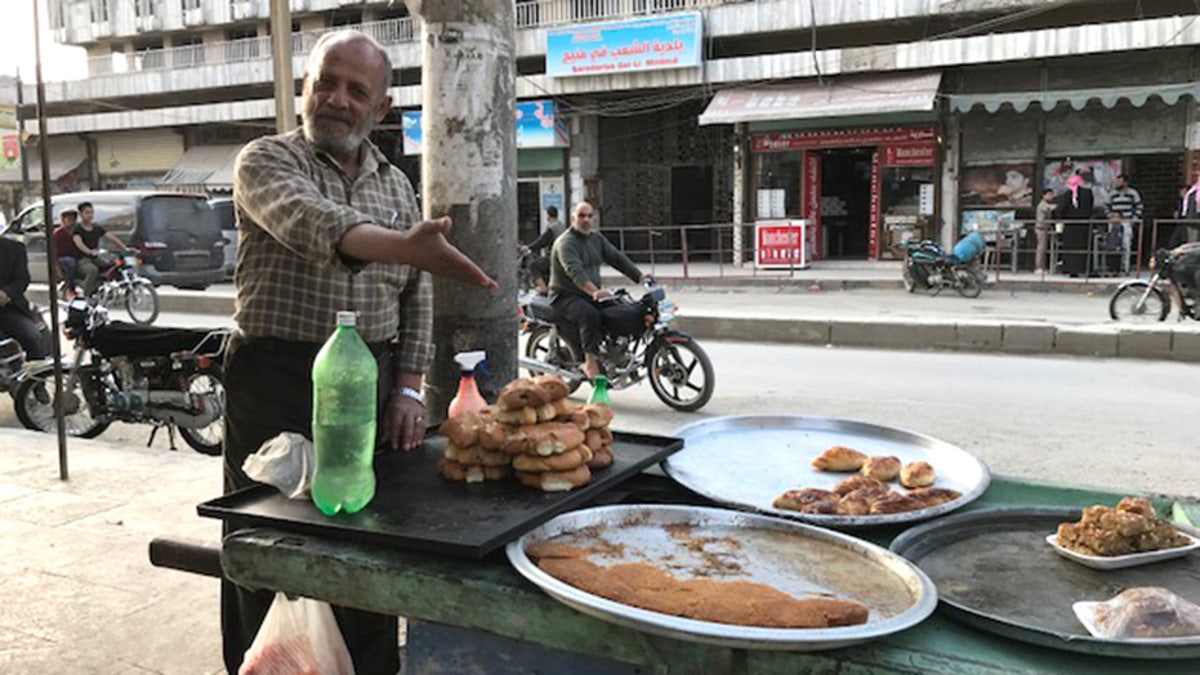
Mahmoud, a 60-year-old sweets seller, was grateful about being spared the aerial bombardment that has ravaged much of Syria. (Fox News)
Others, sitting in the streets with cigarettes and tea, said they weren’t familiar with all the political ins and outs, but recognized their environment was far more stable than others'.
“The most important thing is we have some stability,” noted Raheem, 45, a tradesman. “We just want to keep this peace. We want anyone who will help is keep this peace.”
But the peace, in which Kurds, Arabs, Turks and other minorities live together, remains fragile.
“ISIS can’t control Manbij again, but there are sleeper cells here. This is a big country and we liberated this city alongside the U.S.,” said Abu Adel, 39, head of the Manbij Military Council, who first joined the Syrian Revolution in 2011 as a fighter with the Free Syrian Army (FSA). “We still have threats, we still need their expertise.”
While ISIS and Turkey remain the most immediate concerns for the council, Adel pointed out that the regime brings with it a fear of losing their newfound freedom.
“When we started with the revolution, it was not about wanting Assad to leave. We just wanted changes, we wanted a chance to speak freely and we waited for the changes to happen,” he said. “But those changes did not happen. And the protests moved from peaceful to military.”
And overlooking a front line, amid growing concern that Turkish forces nearby could encroach farther into Manbij (given their concerns of hideouts occupied by designated terrorist group the Kurdistan Workers Party (PKK)), one Manbij Military Council soldier Laurence reiterated his desire for the U.S. to stay engaged.
“I was so happy for this bombing. Innocent children should not be killed with chemicals. Fighting military troops is one thing, civilians is another,” Laurence said, before eagerly detailing his “life-saving” medic training under U.S. forces.
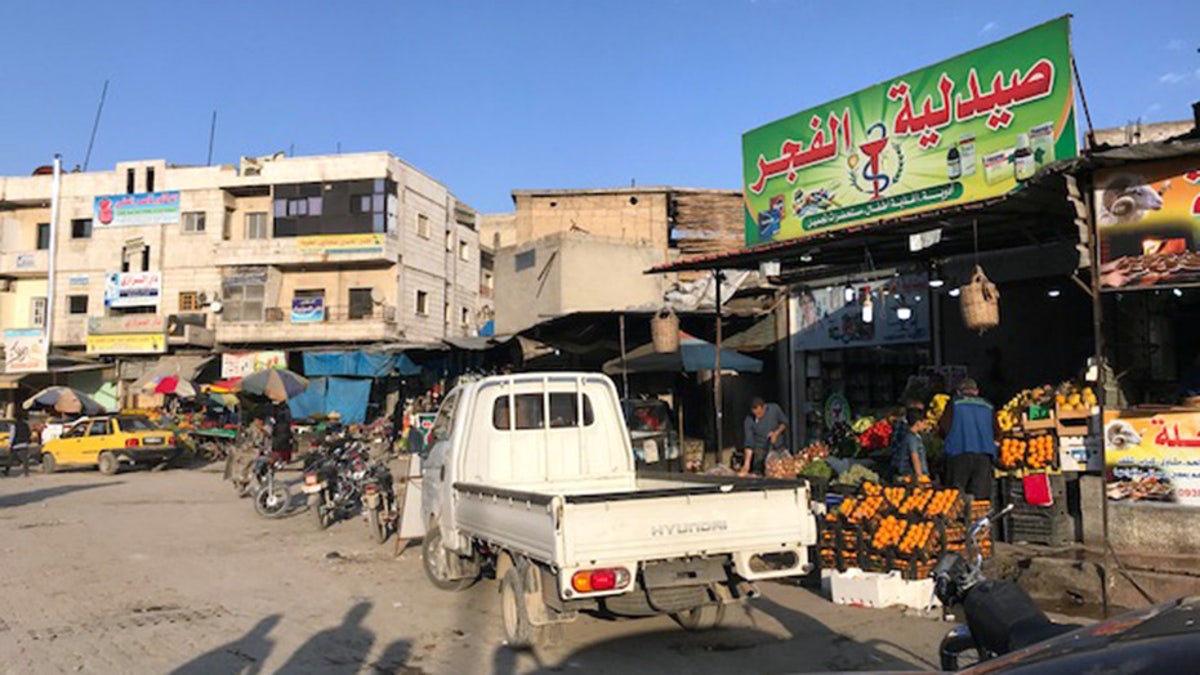
While much of Syria remains plagued by changing checkpoints and intermittent bombing, Manbij remains a bustling yet seemingly calm city. (Fox News)
“We can defend ourselves, but having the U.S. morale behind us has been important. We hope they stay.”
Nonetheless, the future of Manbij remains unclear for now, prompting others to crave a time before the uprisings of 2011, which later developed into a bloody and protracted conflict.
“We don’t know what will happen tomorrow,” lamented Tahsin, a displaced Yazidi from Afrin living in an abandoned building in the Kurdish city of Kobane. Yazidi people are an ethnic minority.
“We don’t know what Islamic rule could come in and whether we will allowed still to be Yazidi.”
